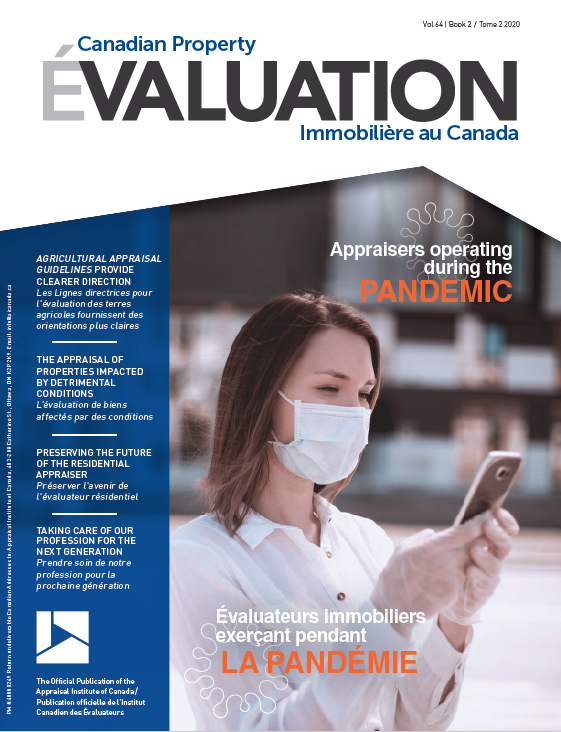Preserving the future of the residential appraiser
Canadian Property Valuation Magazine
Search the Library Online
Preserving the future of the residential appraiser
By Timothy R. Groulx, FRI, CRA, P. App., Lakewood Appraisal Services, Thunder Bay, ON
Data harvesting and automated analysis to provide evaluation of mortgage risk has been going on for years in Canada beginning with the Canada Mortgage and Housing Corporation (CMHC) emili program introduced in 1996. The members of the Thunder Bay Chapter of the Appraisal Institute of Canada (AIC) were advised recently that, following the rapidly progressing trend for data harvesting and computer analysis in the United States leading to ‘instant’ real estate appraisals, we can expect the demand for residential appraisals, and, therefore, residential appraisers, to wither in the next 10-20 years.
A question arose as to what the future holds for residential real estate appraisers: “Where would enough demand come from in the future for residential appraisers to earn sufficient income to provide a comfortable life for their families?” The question was posed to representatives of the Ontario Association during the general discussion portion of the Thunder Bay Chapter’s Annual General Meeting held in March 2020. The prognosis provided for the residential appraiser was not good. The path to a comfortable lifestyle for residential appraisers of the future was said to be in appraising machinery, doing condominium studies or qualifying as commercial appraisers.
The spring edition of Canadian Property Valuation, which arrived in April 2020 (Volume 62, Book 1), had two articles that came together to crystalize some thoughts I have been having about the future of our profession and the role of our professional governing body in the lives of those who will follow us in this career. The articles were entitled Will AI steal your job? and Advocacy.
In the future, it may come to pass that the demand for current market value appraisals of residential dwellings up to and including four-plexes will be substantially satisfied by artificial intelligence. That displacement of the appraiser by a computer will likely be predominately adopted by major financial institutions. Such organizations have large enough portfolios to take advantage of the cost saving of paying for a computer printout and accepting the inherent margin of error and associated risk versus paying for a full appraisal following an on-site inspection backed up by professional liability insurance.
So, where will we find enough work in the years to come if our business with the banks is going to dry up? I have some suggestions that are based on the purpose of the appraisal and, therefore, the associated typical user.
Estate appraisals for probate (Estate Administration Tax)
The requirements for an application for probate changed in Ontario a couple of years ago. The changes required a proper valuation of the estate’s real estate rather than accepting estimated values. That change was originally taken to mean a retrospective market value appraisal as of the date of death of the owner conducted by an accredited appraiser. Every death in Ontario where the deceased owned real estate should have resulted in at least one real estate appraisal.
What is happening in the District of Thunder Bay is that many applications for probate are being submitted based on property tax assessments, which could be up to four years old or based on a real estate agent’s one-page letter of opinion.
The AIC provincial associations could aid their members now and well into the future by researching their province’s Ministry of Finance’s expectations for the supporting documentation for an application for probate, and then advocate with their provincial law society, clerks of the Probate Court and law firms that due diligence requires proper valuations done by professionals.
The consequences of making an error in an application for probate in Ontario are quite clear:
Estate Administration RSO Chapter 4
para 4.5(2) The Minister may, at any time he or she considers reasonable, assess or reassess an estate's tax payable if the Minister establishes; or (B) that any person made a misrepresentation that is attributable to neglect, carelessness or willful default (emphasis added), or has committed any fraud in supplying information regarding an estate or in omitting to disclose any information regarding the estate.
para 5.1(2) Every person is guilty of an offense who, in giving information required under section 4.1, makes or assists in making a statement that, at the time in the light of the circumstances under which it was made, is false or misleading in respects of any fact, or that omits to state any fact the omission of which makes the statement false or misleading.
para 5.1(4) Every person who is guilty of an offense under (10) or (2) is liable on conviction: (a) to a fine to an amount that is at least $1,000, but does not exceed twice the amount of the tax payable by the estate if that amount is greater than $1,000; (b) to imprisonment for a term of not more than two years; or (c) to both clauses (a) and (b).
The Act indicates that everyone who had a hand in filing an inaccurate application for probate is jointly responsible. That would include the administrator(s) of the estate, the estate’s lawyer and the estate’s accountant. A proper appraisal by an accredited appraiser relieves the individuals working on an estate from worrying about neglect, carelessness or willful default.
Capital gains tax appraisals: current and retrospective
If you receive property as a gift, you are generally considered to have acquired the property at its fair market value (FMV) on the date you received it. Similarly, if you win property in a lottery, you are considered to have acquired this prize at its FMV at the time you won it.
When you sell your home, you may realize a capital gain. If the property was solely your principal residence for every year you owned it, you do not have to pay tax on the gain. If at any time during the period you owned the property it was not your principal residence, or not solely your principal residence, you might not be able to benefit from the principal residence exemption on all or part of the capital gain that you have to report.
When a person dies, the Canada Revenue Agency (CRA) considers that the person has disposed of all capital property right before death. The CRA calls this a “deemed disposition.” Also, right before death, the CRA considers that the person has received the deemed proceeds of disposition (the CRA will refer to this as “deemed proceeds”). Even though there was not an actual sale, there can be a capital gain or, except for depreciable property or personal-use property, a capital loss.
The AIC could aid its residential appraisal members in the years to come by researching the government’s expectations for the supporting documentation for capital gains tax return, and then advocating with law societies, accounting associations, legal and accounting firms that due diligence requires proper valuations done by appraisal professionals.
Valuations in support of marriage contract or pre-nuptial agreement
In an era of mixed and blended families, family law lawyers and personal accountants are acutely aware of the advantages to their clients of pre-nuptial agreements. Values of properties brought into the marriage by each spouse should be valued by accredited appraisers to assist the family in starting their new lives together.
Divorce appraisals: current and retrospective
Just as there are times of great joy, there are also emotional endings. When dissolving a matrimonial estate, valuations of real estate held by parties to the marriage need to be carried out. Some of the effective dates of these appraisals may include as of date of marriage, as of date of separation, and current value, depending on each family’s situation.
Lawyers, mediators and accountants, as well as clerks of the Family Law Courts, should be made aware that it is in the best interest of the parties to an action that market values of the assets are estimated by qualified appraisers and settlements are not based on personal estimates, assessed values, or letters of opinion. Proper appraisals can limit costs incurred in litigation and limit the possibility of having the case re-opened in years to come.
Our governing professional body could also provide a great service to real estate brokers and sales representatives by explaining that, in spite of the disclaimers in a letter of opinion meant to protect them from liability, if: real estate representatives hold themselves out to be experts; offer an opinion that was flawed; and their client relied on that opinion and suffered a loss; then: they are professionally liable for their client’s loss.
In Ontario, a real estate broker or sales representative’s professional liability insurance with the Real Estate Council of Ontario (RECO) does not cover this situation.
Estate planning
Our governing body should be advocating steadily with accountants, financial planners and investors on behalf of its real property appraisal members to ensure that fiduciary actions taken by these advisors call for professional, comprehensive and independent opinions of the value of their clients’ real estate within their financial portfolios. In order to meet the expectations of due diligence, these opinions of value need to be conducted by accredited appraisal professionals.
Foreclosure, power of sale, or Sheriff’s sale
When a lawyer is enforcing a lender’s security of a bank, trust company, credit union or private investor, the lawyer is required to be able to demonstrate to the Superior Court or to the Sheriff that all attempts to mitigate the damages have been taken and that the proceeds of any sale were reasonable in the given situation. This requirement usually is met by offering the security for sale by well publicized tender or auction or by listing the property for sale on the local Multiple Listing Service. An additional method to demonstrate the reasonableness of a sale is by having an estimate of market value prepared which was not made public prior to the sale.
Our governing professional body could aid its members directly by advocating with law societies, the Courts and law firms that proving an effort to mitigate damages requires proper valuations done by professionals. Valuations based on a letter of opinion or on a property tax assessment are not appropriate in these situations.
It has been 60 years since my dad was replaced by the earliest of computers and left his job as an industrial clerk to go into real estate. I followed my dad into this business 45 years ago and expect to leave it doing what it is that I do. This may not be possible for those who follow us.
The AIC’s role in advocating on public policy issues is a valuable one and a valid contribution to the life of our country. I hope and trust our governing body will put the effort into securing the future of residential real estate appraisers to come through its advocating on their behalf now.





